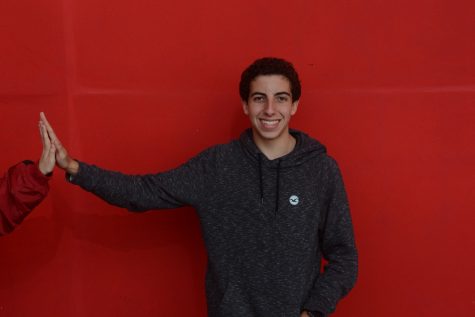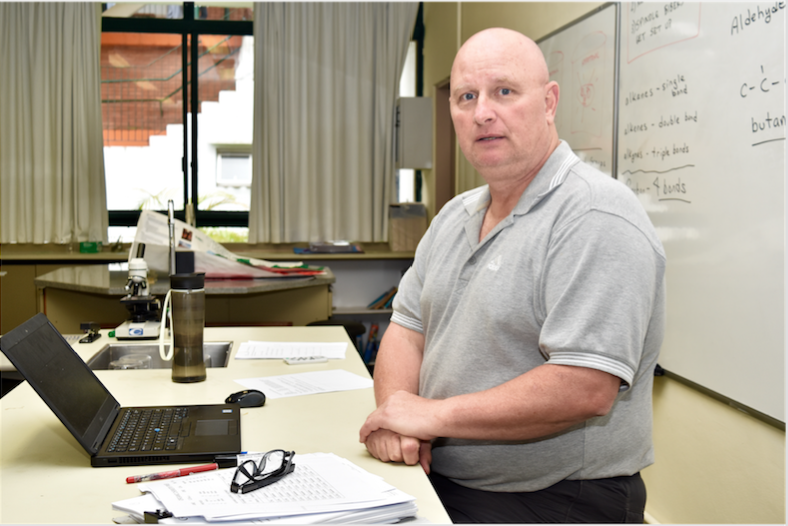Back in Ohio, Thailand and Saudi…
John Scramling’s 37th year teaching chemistry is his first at Graded. He grew up in Cleveland, Ohio, is an avid fan of the Cleveland Indians baseball team, and, like most kids growing up in the United States, he aspired to play for his favorite team. His dad, however, hoped he would become an accountant. But becoming his dad’s book-keeper at age 8 did not help pique Mr. Scramling’s interest in the world of accounting. When the time came to leave home for college, he decided to pick the polar opposite of accounting and became a forest ranger.
He was admitted to, and enrolled at, Michigan State because of the university’s strong forestry program. However, after only a few classes into his new major, Mr. Scramling realized that he had no business pursuing a career that did not interest him. At that point, he was already a soccer coach and really enjoyed working with kids, which motivated him to become a teacher. He said: “I thought I’d be good at teaching. I was able to stay involved in the sciences, which I’ve always liked.”
Mr. Scramling started out teaching sixth graders, including future NFL players, such as Robert Smith and Elvis Grbac. Robert Smith was a running back for the Minnesota Vikings, and Elvis Grbac was a quarterback for the San Francisco 49ers, the Kansas City Chiefs and the Baltimore Ravens. Later, as a high school teacher, he also taught future NFL players, namely Roy Hall, a wide-receiver for the Indianapolis Colts, the New Orleans Saints, the Omaha Nighthawks, and the Detroit Lions.
After teaching for a few years, Mr. Scramling resigned and worked as a chemist while looking into careers such as chemical engineering and potentially even medicine. It was then that he realized how much he missed teaching, and he soon got a job at Brush High School, near Cleveland, where he taught for 25 years.
Mr. Scramling’s first overseas job was in Venezuela in 1984, a “time of change” for the country (the fall in world oil prices generated unrest in Venezuela and government spending in welfare was cut. The Democratic Action party candidate, Lusinchi, was also elected president and signed a pact involving the federal government, trade unions and businesses.) After 2012, he left Brush High School and went to teach in Thailand for two years, then Saudi Arabia for another two years and finally to Brazil in 2016.
The stories that have earned him fame at Graded (“Back in Ohio…,” “Back in Saudi…,” etc.), recount some of his favorite memories from his past teaching experiences abroad. “You know, when I think back to Brush, I really enjoyed it there. It’s the people that make all the difference and I remember them fondly…. So it’s probably the friendships that define the funny stories I tell now,” Mr. Scramling explained. To him, friendships go even further. “You know, teaching chemistry was my job, and that was what I was there for,” he recounted. “But when you get together with your old colleagues and students, even the ones from my first class in ’79, you don’t sit back and say ‘Oh boy, those equations were fun to balance.’ It’s just the friends you make. I still chat with probably 15 of the kids from my first class, and they’re like 50 years old by now. I bet there are another 20-25 of my players that I still talk to, and I’ll even drop by during Christmas, when I’m back home, to see everyone again.”
Mr. Scramling has been coaching soccer teams for almost his entire teaching career and was even nominated for the Ohio Soccer Hall of Fame.
Having been with the sport for so long, he has seen a real change in the game in the United States. The popularity of soccer skyrocketed exponentially in the US while the quality of refereeing caught up to the sport on a slower, linear-like graph. “So you were getting a lot of guys that didn’t know what they were doing as referees for high school soccer matches.”
Living and working in other countries was a totally different story. Life in Saudi Arabia was very interesting. Mr. Scramling said: “the teaching was fine, all good. But the country is rather restrictive. What I missed the most over there was the lack of movies—and I love movies. During my second year, I lived five minutes away from the big bridge that connects to Bahrain. But to go there, you’d have to wait in line, get a Visa and everything. So if you left at the wrong time, it would be like a three hour drive to watch a movie.”
The science labs in Saudi always posed a certain challenge to the teachers, especially when it came to wiring and gas lines. One day, during last block, the power went out in the room, but only for two of the islands in the lab. “So the students’ hot plates just stopped working and nobody noticed until we looked at the little green light. It’s just crazy how they do the wiring and think it’s all good.” The science labs in Saudi Arabia were hooked into two gas tanks located outside the classrooms in a locked closet and only the custodian would have access to the key. “You’d think that we would be using one tank of gas at a time and when one finished they’d switch the source to the other and replace the empty one in a constant cycle, preventing you from effectively running out of gas. But, instead, the two were connected together, so when they emptied, you had no gas.” These stories highlight the stark differences between international and American schools in Mr. Scramling’s eyes. “Supplies in the US were much easier to come by, compared to Saudi Arabia or Thailand.”
In Thailand, all first-year teachers lived in the same apartment building. The apartments were new, but “they were not the highest quality. For instance, the internet was terrible…it was basically like a college dorm. We were like adults living in dorms again,” he recounted. “I had a gap under my door that was like 10 inches high instead of a few tenths of an inch. The joke was that animals would be able to crawl right into your apartment so we’d have to jam stuff in there every night to prevent that.”
Mr. Scramling is very excited about coming to Graded and coaching the high school varsity boy’s soccer team. “So far, it’s been a great, great start. Coaching has got me very busy, but the team has definitely improved since August. The staff here are very friendly and outgoing, and the kids are easy to talk to.” One of Mr. Scramling’s favorite lessons learned from traveling the world, and one of the largest takeaways from the interview, is that people “are the same all over, for the most part. People are people. When you look at recent political events, you’d think that there are these huge borders bisecting our society when there actually aren’t. Most people just want to live their life and be happy and the same goes for students. Students just want to get good grades, enjoy time with their friends, and invest in their hobbies. By traveling all over the place, you learn that there are always more similarities in things than differences.”

Ever since he first “read” a book by himself (or at least phonetically memorized the contents after having it read aloud repeatedly), Alexandre has...

Lord YeJin strikes back once again in The Talon as the Photographer, the Layout Editor, and the Image Master (finally!). Evicting Gabriel Civita, the former...











Barry Zuckerman • Feb 27, 2023 at 10:06 pm
Scram, did a hell of a lot more than just coach my son Eddie Zuckerman at Charles F. Brush.Scram also taught are son chemistry and about how to act like a compassionate human being. Barry Zuckerman
Siri Berman • Dec 5, 2016 at 2:19 pm
Very interesting article!!! Mr. Scramling has a fascinating life!